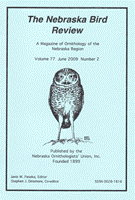Nebraska Ornithologists' Union

Nebraska Bird Review
Date of this Version
6-1998
Document Type
Article
Citation
Hansen, Three Poems, from Nebraska Bird Review (June 1998) 66(2): 70-71.
Abstract
Twyla Hansen was raised on a farm in northeast Nebraska on land her grandparents farmed as immigrants from Denmark in the late 1800's. And since 1982, she has worked as a horticulturist and arboretum curator at Nebraska Wesleyan University. Twyla Hansen, in the words of Bill Kloefkorn, Nebraska's State Poet, "connects": "Her truths are in those taproots without which poetry would surely expire for lack of nourishment."
She received her B.S from the University of Nebraska. Twyla and her husband Tom live in Lincoln where their yard is maintained as an urban wildlife habitat. In 1989, the Nebraska Statewide Arboretum awarded her the Johnny Appleseed Award for "sustained personal involvement in tree planting."
The recipient of the 1988 trophy buckle poetry prize from Elkhorn Review, Twyla Hansen has published two collections of verse, How to Live in the Heartland (1992) and In Our Very Bones (1997). Her poems--whether they feature her husband's snoring or the prairie's flowing--attest to her bountiful love of the environment and her joyful connections with the people of Nebraska. As Don Welch says of her work, "This poet's got it. By gosh, she's got it. Got this place down pat. Its genus is Nebraskensis, and its species is pure Hansen."
The following poems, "Blue Heron," "Warbler," and "Turkey Vultures" appear in Twyla Hansen's book, In Our Very Bones (available from Slow Tempo Press, P.O. Box 83686, Lincoln, NE 68501-3686).
Blue Herons
What does it mean- all day
rain coming straight down, slow,
a noticeable absence of wind,
leaves plush beneath canopies,
stilt-legs in the flooded fields?
All morning I have glimpsed them-
along this highway bottomland
the river tried hard to reclaim,
broken dikes and debris and backwater-
blue- gray sentinels nearly motionless,
patient for a meal.
And what can we do-
in these wide-open spaces
where mud creeks are capable
of churning out of their banks,
flattening brome and fence and farmland-
but to take inventory of threatened senses,
to pick ourselves up above the water,
to rise, to rise?


Comments
Copyright 1998, Nebraska Ornithologists' Union. Used by permission.